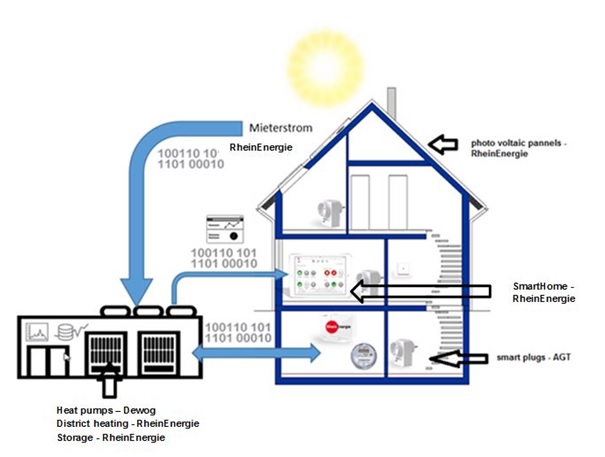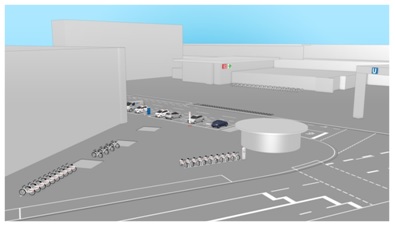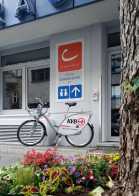“We hope in Cologne that with the “GrowSmarter Project”, we will be able to find more than just one solution to a single problem. We would like to develop blueprints for the sustainable development of complete neighbourhoods”. (Quote of former Cologne Mayor Jürgen Roters in his speech whilst the Kick-off Meeting to Grow Smarter on 10th February 2015 in Stockholm, Sweden.)
Over the last months we have seen the scaffolding go up in the Stegerwald settlement where we aim to implement a range of integrated solutions and talked to citizens, we have our data platform which is now in its first stages of being set up and our mobility hubs where we have run in to some issues…!
Action area 1: Low-Energy Districts
Energy efficiency & citizen involvement: the Stegerwald Settlement
Partners involved: RheinEnergie, Dewog and AGT
Facts about Stegerwald Settlement
Construction year: 1953
Floor space: roughly 33.529 m2 (concerning only the actual refurbishment)
Energy consumption (2013): 163 kWh/m2 per year (heating and hot water)36 kWh/m2 per year (electricity)

Germany’s buildings account for almost 37% of the country’s greenhouse gas emissions (2010). Houses from the 1950s, like those in the Stegerwald Settlement, tend be lightly insulated. It is common to find attics with a single layer of insulation and walls with insulating values that are much lower than that required in new homes.
As part of Cologne’s commitment to the Mayor’s Covenant and “Klima-Bündnis” towards improving energy efficiency, we are working to create next-generation properties without these fundamental flaws to address the growing concerns over energy consumption, working towards a more sustainable future. In the GrowSmarter project 16 multi-family homes in the Stegerwald Settlement will benefit from a number of integrated solutions.
In the middle of August 2015 we were pleased to see the scaffolding going up in the Stegerwald Settlement district.
The buildings will have to adhere to Germany’s Energy Saving Regulation (EnEV) (last amended in 2014) which sets out thermal insulation standards for residential and commercial buildings. The regulation sets out values for the construction of new buildings but not for existing buildings. Therefor were are using empirical values.
The partners RheinEnergie, Dewog, and AGT have teamed up to provide measures for the tenants living in the Stegerwald Settlement in Cologne. In order to reduce the lead and consumption of primary energy, in the Stegerwald Settlement, RheinEnergie will install electric storages, PV, a district heat connection and heat pumps (by DEWOG) in the next two years. These all will be managed by a software like a software for a virtual power plant; called “Siedlungsmanagement”. At the same time DEWOG will implement energetic and structural measures.
Within the project GrowSmarter some apartments (50 to 100) will get a SmartHome equipment to save electricity and warm water for heating. The third partner, AGT International, will provide its expertise in acquiring energy consumption data on device level and its proven comprehensive data analytic capabilities developed in the BMWi funded project PeerEnergyCloud.
Energy consumption will be measured by Smart Plugs transmitting the data wirelessly and securely to a local gateway. Data will be pre-processed, anonymized and send via a secure channel to the backend systems. Here, advanced data analytic components will provide insights into the consumption behavior.

In a first step RheinEnergie, Dewog and AGT are developing a concept addressing the tenants in the Stegerwald Settlement about the benefits using Smart Energy solutions (2015-November-24). Additionally, a technical feasibility study is currently planned and will be realized in the next months.
Action area 2: Integrated infrastructures
Cracking open data - stimulating local entrepreneurs & traffic management
Partners involved: The Urban Institute and Microsoft
Something very new for us is our foray into expanding our digital infrastructure in the form of our open data platform www.offenedaten-koeln.de, an official site providing free access to a number of data-sets from Cologne.
We believe data is a source of massive potential value for cities to enable sustainable growth and tackle environmental and economic challenges. By technologically enabling the city we hope to tap into this potential value to create a fully-integrated, strategically-designed smart city; a concept which is also at the heart of the GrowSmarter project.
So, how does the platform work? Well, together with our partner ui! – the urban institute which is providing the software architecture (based on its platform UrbanPulse) and Microsoft, which is providing the Cloud infrastructure, Cologne plans to make city data available to citizens — securely and affordably. UrbanPulse gathers existing sensor data, such as data from Cologne’s traffic management system, and displays this data as annotated street maps via a web server.

The data platform is now up and running with users able to access and download non real-time traffic flow data. We are not quite at the stage of being able to offer real-time data, but we are working on it and exploring additional data sets which could be incorporated e.g. the road construction sites. This initial platform was demonstrated at the International Automobile Exhibition (IAA) in Frankfurt as part of the New Mobility World.
An on-going discussion with the City of Cologne in the development of this platform has been a concern about privacy issues. So far, all data comes from urban sensors and no personal or individual data is being stored or used. But as we look at expanding the data sets for example to include energy related data, this issue will be addressed.
A second issue is the security of data. One of the reasons to choose Microsoft Azure® has been because it is the only leading provider of cloud services to support the world's first international standard for data security in the cloud, known as ISO / IEC 27018 , and developed by the International Organization for Standardization (ISO). The standard aims to create a uniform and internationally valid concept to protect personal data stored in the cloud.
Ultimately we hope by unlocking public data and making it available to interested citizens, entrepreneurs and organisations to open up new value chains that spawn innovative and smart solutions which in turn boost sustainable modes of city living and working.
Action area 3: Sustainable Urban Mobility
Mobility hubs – when do public and private interests overlap?
Partners involved: Ampido, Cambio, KVB
In an attempt to reduce traffic on the roads three “mobility-hubs” will be installed as part of the GrowSmarter project. These hubs are comprised of several car sharing lots and also space for people to park their car a little way outside of the city centre and to take one of the provided E-Bikes to complete the rest of their journey. In addition there is the possibility to charge E-Cars. The energy to charge the E-Cars will be produced at the multi-family homes which are being refurbished (mentioned above).


image copyright cambio Köln
I will be back soon with more experiences with implementing the first smart solutions in Cologne in the next blog, but please feel free to share your thoughts and experiences this far in Cologne.

Barbara Moehlendick
Site Manager, Cologne



